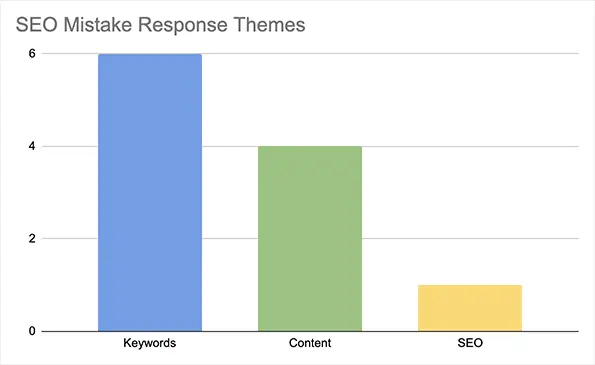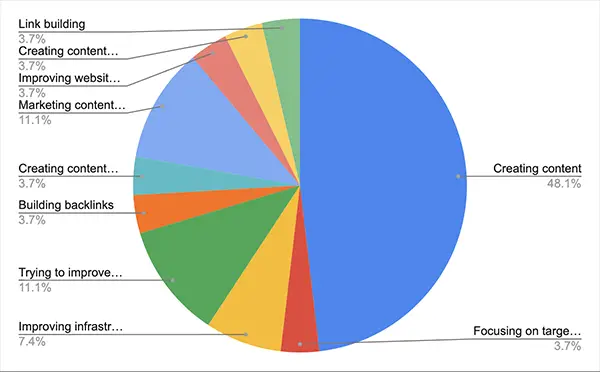
2021 SEO Advice From Publishing and Blogging Experts
Get helpful updates in your inbox
As 2020 has come to a close, publishers are looking to press forward into 2021. Many sites are considering what steps to take to write better content, acquire more traffic, and make more revenue.
In a survey of 17 industry experts, we pulled together their top advice on SEO, revenue, content, keywords, traffic, and more. These experts have succeeded as content creators in written content, video, and/or audio. Most of those included also actively manage communities or offer courses on these topics.

Common SEO mistakes publishers make
Many respondents said one of the most common SEO mistakes is poor keyword research.
First of all, it’s important to actually conduct keyword research. New writers may believe that just by writing content that is interesting to them, they will be successful. However, even good content won’t get noticed without proper planning and research.
“One of the biggest SEO mistakes publishers can make is failing to do a Google search of their chosen keyword before writing the article or sending the keyword to a writer,” said Emilia Gardner who owns multiple websites, including momadviceline.com. “Just doing a quick search can tell you loads that the keyword tools do not.
You can take these suggestions, research them in a keyword tool, and see which ones you can rank for. We discuss this in more detail in our blog about ranking for ‘position 0,’ or the rich snippet.
Additionally, publishers should beware of trying to build their articles around keywords that may prove to be highly competitive, said Chris Drew of nichesafari.com. Growing publishers may not rank in search if they choose keywords that are too high-volume; there is just too much competition and those with more authority, or established expertise, will be tough to overtake.
By targeting lower-volume, “long-tail”, and appropriately-sized keywords, and doing a mix of high volume and low volume keywords, publishers can get more niche and will be more likely to rank. This is where long-tail keywords can come in handy.
While using long-tail keywords is one tactic to use in writing articles, you can also use multiple keywords you find for a single article, said Sharon Gourlay, who owns both simplerandsmarter.com.au and diveintomalaysia.com. This strategy is commonplace and still one of the top performing methods of increasing the odds of an article ranking over time.

“SEO is more than just coming up with a main keyword and not thinking further than that. For one, use many keywords and don’t just get caught up on one. But it’s also important to think about link building and good site structures,” said Sharon Gourlay again.
Another thing respondents suggested was to focus on who is actually reading the content.
First, content may want to avoid excessive editorialization (opinions), said Chelsea Clarke of herpaperroute.com. Answers to questions lend themselves to factual, straight forward information in most cases.
By researching the keywords your article already ranks for, you can see if it makes sense to redirect that content towards other keywords so it ranks higher. We discuss how to increase traffic quickly with new organic keywords and augmented content in another blog post.
“Underestimating the power of good SEO is a big mistake publishers can make,” said Shawna Newman who owns skipblast.com.
This includes optimizing title tags, content, internal links, image alt text, and URLs. Ezoic has a title tag tester that tests titles to see which will rank better. This means better search ranking, more organic traffic, and higher CTR.
What articles generated the most revenue and why?
Respondents to the survey had many approaches to generating high revenue for their articles, particularly their most lucrative.
One common method amongst the surveyed publishers was that they targeted high-value products or industries in some way, whether that be reviewing high-value products, discussing topical trends in industries that are thriving (think baking bread at the start of the pandemic), or offering insights into alternative brands, products, or methods of engaging in a popular (or emerging activity).
Publishers can target green grass by focusing on topics that didn’t exist before, but now may be growing quickly. Large brands often aren’t responsive to these topics, giving growing publishers the best shot at quickly generating content that can rank for trending search terms.
Chris Drew’s most lucrative article was a review of a high-priced, high value product sold on Amazon. They were able to build a content hub entirely around this product, so Google sees them as an authority on it.
“My 4,000 word buyers’ guide generated the most revenue. I think it generated the highest income due to targeting products that are over the $400 price point and having healthy guest posts and niche edit backlinks pointing to the page to help it rank in Google,” said Shaun Marrs, who owns photographypaws.com.
Finding niche products or content like these publishers to write reviews about is especially lucrative if you can pair affiliate marketing with the product. Affiliate marketing is great for targeting buyer intent keywords because these keywords often have higher EPMV than normal keywords. These can be articles that monetize via display ads and affiliate links.
On the other hand, one publisher took the opposite approach and wrote about cheap or inferior products/services/industries.
“Most people write about the best and most popular brands and industries. In contrast, I chose the less in-demand products and wrote a review about why they’re not the best. Turns out, there are a lot of people out there looking to buy a cheaper version of the in-demand product because the hot product costs a lot of money,” said Emilia Gardner.
Lastly, Mushfiq Sakur of thewebsiteflip.com used a combination of display ads and affiliate links to increase their overall page-level RPM, while Shawna Newman had an article with step-by-step guides with original photos and affiliate links. Adding images to your content can greatly increase its readability and user-friendliness according to most of the experts interviewed.
One piece of advice for bloggers and publishers in 2021
Our industry experts all had plenty of advice for fellow publishers out there. Many of the respondents discussed the journey of digital publishing (including this one that claimed they wish they would have known this prior to getting started).
Alex Cooper, who owns multiple websites including knowledgeablemind.com emphasized the importance of patience and perseverance. Getting traffic and revenue is more of a marathon than a sprint if you have a site that is still new.
“Don’t start blogging as a New Years resolution and give up by March; give it at least a year and expect initial traffic growth to be slow,” said Shaun Marrs.
Focusing on user experience and EAT (expertise, authoritativeness, and trustworthiness) is advice echoed by many in the group, particularly Jaryd Krause of buyingonlinebusinesses.com.
Mushfiq Sakur said publishers need to be tough. “Be gritty. Grit is the most important trait to have as a niche blogger as the ability to rebound through obstacles is crucial in this game.”
Others’ advice focused on content and how creating great content is critical as a publisher. First, Sharon Gourlay advices to look for audiences that want to be served and currently aren’t, as this will make you the expert on the topic and begin ranking in search.
“Once you have an audience, focus more of your time on quality content and less on the quantity of content you produce,” said Ron Stefanski, who owns prisoninsight.com and bengalcatclub.com.
“Short, to-the-point content that cuts out the fluff is important in content creation,” said Carl Broadbent of oofgrid.com
Additionally, Morten Storgaard, who owns multiple sites including godownsize.com, said mixing up your content between educational and commercial content can get you diverse traffic and generate different types of revenue. Being data-driven only works when you have the right data to start with.
“Do more video. Or, if you don’t like being in front of the camera, try podcasting,” said Doug Cunnington, who owns intrepidoutdoors.com.
This can be especially lucrative if you notice that a particular search result has written material but very little media-related results. This can help niche websites approach authority topics more effectively. Video is growing rapidly and it’s the perfect time to join the growth.
What will you focus most on to improve organic traffic?

- Creating content around niche or long-tail keywords: 13
- Focusing on targeting keywords that are highly relevant to existing content and website niche: 1
- Improving infrastructure and user experience: 2
- Trying to improve existing content: 3
- Building backlinks: 1
- Creating content on high-volume keywords: 1
- Marketing content on other platforms to improve popularity: 3
- Improving website speed: 1
- Creating content based on buying intent keywords where I can rank in the top 10: 1
- Link building: 1
Our take on 2021
So what is our advice for 2021? If we look at digital publishing trends from 2020 and 2021, we can see that it pays off to be agile. Things can change on a dime, as we saw in 2020, and having flexibility is key to remaining successful.
Additionally, publishers should spend more time analyzing their top landing pages, audience engagement, trending topics, and high-earning content categories. Publishers who know their site and its analytics well will come out on top in 2021. Look for opportunities within these analytics, like creating similar content to your highest-earning landing pages.
Publishers who have teams will need to understand their authors’ financial contribution to the website and how to manage all of the new content being produced in order to grow in 2021.
It also doesn’t hurt to try new mediums. Video is growing in popularity and audio is on the rise as well. Consider adding in a video series or podcast to your already scheduled content as supplementary material.
On that note, publishers should be prepared to experiment and test. Knowing your ROI on your SEO efforts and considering new monetization models will help publishers know where to best spend their time. Those who blindly go through the digital publishing process are more likely to fail than those who look at their website objectively and through available data.
Whitney is a former journalist for numerous city-wide newspapers and online media sources and an accomplished digital and creative marketer. She has multiple years of digital publishing expertise and contributes regularly to all of Ezoic's content sources.
Featured Content
Checkout this popular and trending content

Ranking In Universal Search Results: Video Is The Secret
See how Flickify can become the ultimate SEO hack for sites missing out on rankings because of a lack of video.
Announcement

Ezoic Edge: The Fastest Way To Load Pages. Period.
Ezoic announces an industry-first edge content delivery network for websites and creators; bringing the fastest pages on the web to Ezoic publishers.
Launch

Ezoic Unveils New Enterprise Program: Empowering Creators to Scale and Succeed
Ezoic recently announced a higher level designed for publishers that have reached that ultimate stage of growth. See what it means for Ezoic users.
Announcement
